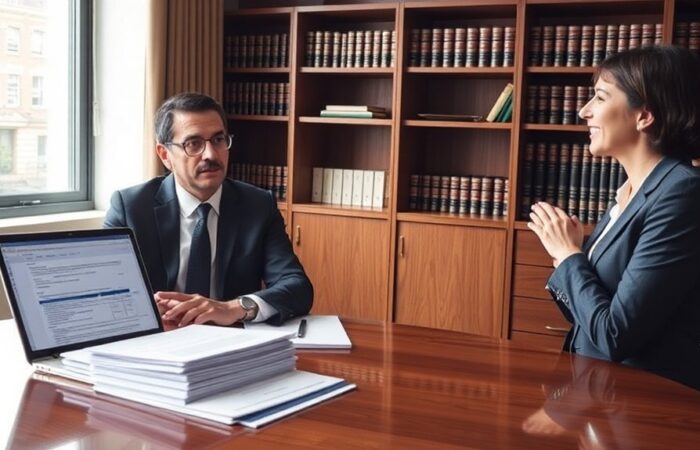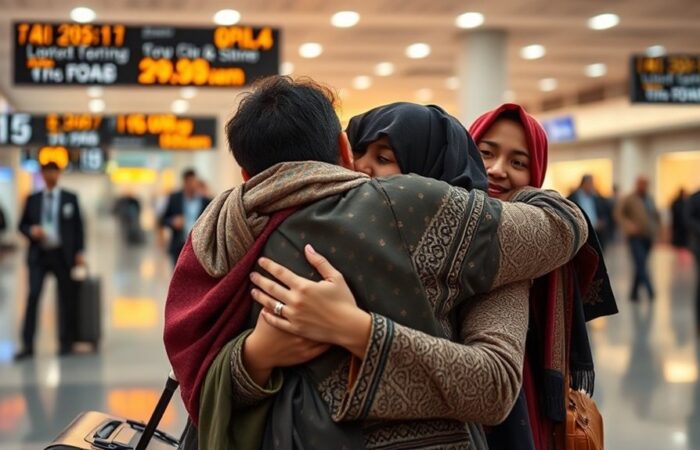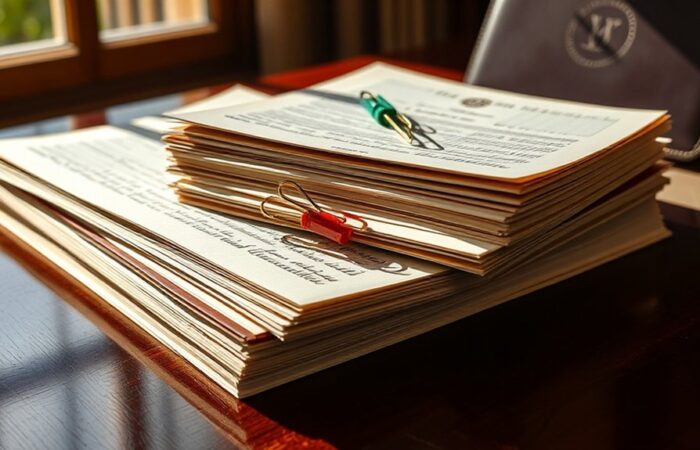If you’re trying to reunite with family from Afghanistan, proving your relationship can be overwhelming. You don’t want a single missing document to slow things down or risk denial. Vieira Braga Advogados understands what’s at stake and guides families through every step, from gathering proof to meeting immigration requirements. You’ll see how their expertise in handling sensitive cases could be the difference you need—and discover just what makes their support so invaluable.
Understanding Afghan Family Reunification Requirements
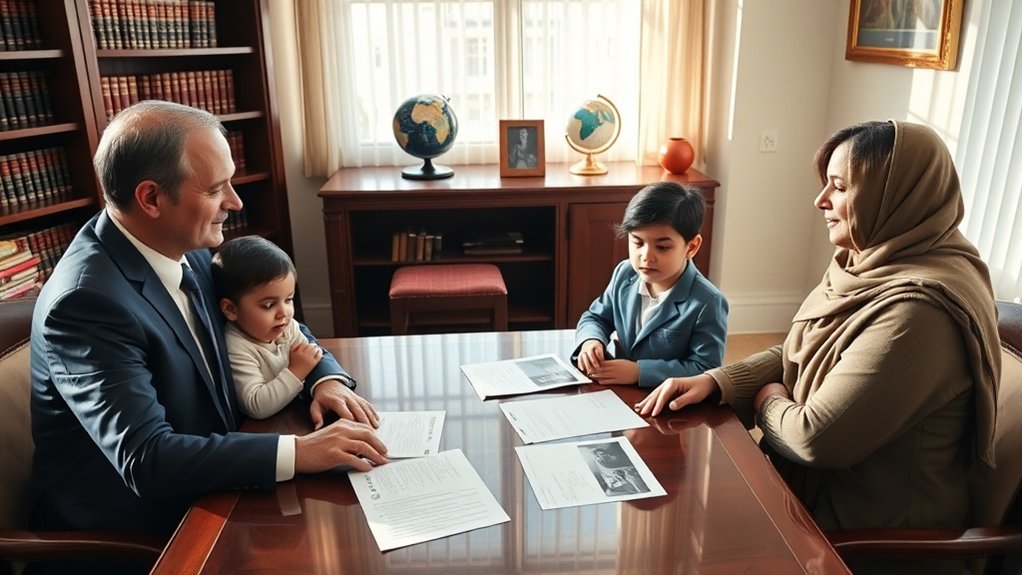
Although navigating immigration processes can be daunting, understanding Afghan family reunification requirements is essential if you want to bring your loved ones to safety. To qualify for reunification, you’ll need to prove your legal family relationship to the relative you’re sponsoring. You must gather official documents, such as birth certificates, marriage registrations, or legal guardianship papers. Immigration authorities expect these records to be authentic and, ideally, officially translated if not already in English.
As an applicant, you should pay close attention to the criteria set by the country where you’re applying. Different governments can have specific definitions of who qualifies as an immediate family member—usually spouses, children, or sometimes parents. Collect evidence that directly supports your relationship claim. Check any additional requirements, like medical examinations, security screenings, or affidavits. If you’re proactive and organized, you’ll streamline the process and help your family reunite more quickly and safely.
For added support, working with specialized legal support can help you avoid mistakes, meet documentation requirements, and increase the chances that your family reunification application will be successful.
Common Challenges in Proving Family Relationships
Meeting the official requirements for family reunification is just one part of the journey—many Afghan applicants find that proving family relationships brings its own set of hurdles. You may face difficulties if you lack official birth or marriage certificates, especially since records in Afghanistan might have been lost due to conflict or bureaucratic issues. Sometimes, variations in the spelling of names or dates on documents can cause authorities to question your claims, delaying your case.
Translations create another challenge. If documents aren’t translated correctly, inconsistencies can arise, making it harder for officers to trust your evidence. Some relatives may have changed surnames through marriage or adoption, adding further complexity. Even simple cultural differences in documenting family ties may confuse officials outside Afghanistan. Navigating these obstacles can be stressful, especially when your loved ones’ safety is at stake, and the emotional weight can feel overwhelming as every small error becomes a potential setback.
Having support to understand legal and bureaucratic issues can greatly improve your chances of overcoming these difficulties and achieving successful family reunification.
The Importance of Accurate Documentation
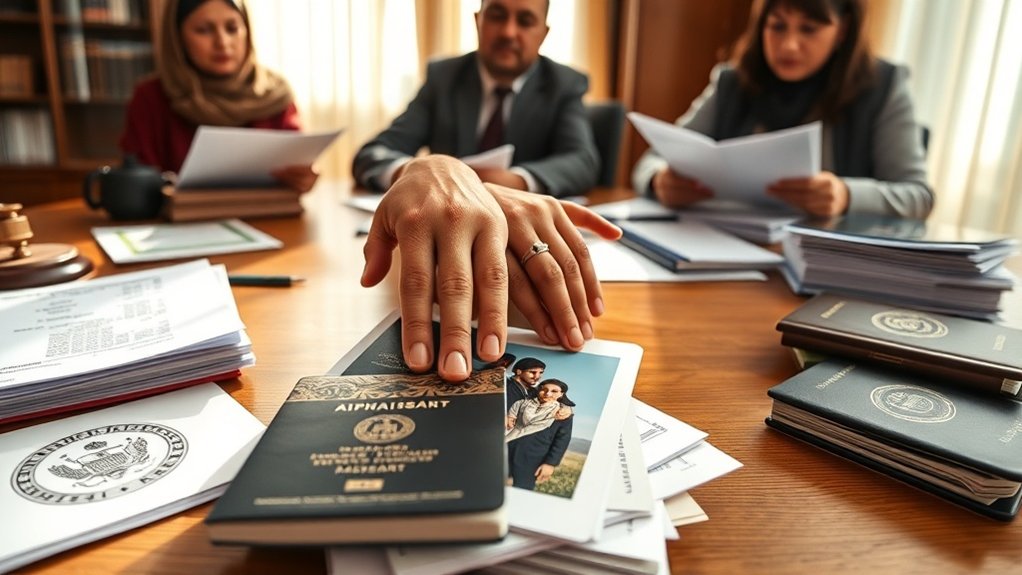
When you’re applying for family reunification, presenting accurate documentation is crucial to moving your case forward smoothly. Authorities rely heavily on the authenticity and accuracy of your records to verify the claimed relationship. Mistakes or inconsistencies can trigger delays, denials, or even accusations of fraud. That’s why you need to double-check everything before submission and make sure every document matches official records.
It’s important to gather documents that are clear, complete, and verifiable. In most cases, officials will closely analyze details such as dates, spellings, and official seals. Even minor errors might cause setbacks or requests for further proof. By giving careful attention to these documents, you demonstrate your credibility and strengthen your application.
Seeking the guidance of a qualified immigration lawyer can help you avoid common errors that may lead to delays or visa denials.
Keep these essentials in mind:
- Double-check spellings, dates, and all personal information for accuracy
- Ensure original documents or certified copies are provided when possible
- Keep copies of everything you submit for your own records
Legal Strategies for Successful Applications
While accurate documentation forms the backbone of a strong family reunification case, knowing how to present your evidence effectively can make a significant difference in the outcome. You’ll need to ensure each document is translated and certified according to the specific requirements of the authorities reviewing your case. Organize your evidence chronologically and label it clearly. Whenever possible, cross-reference documents, such as linking birth certificates with photos or affidavits, to strengthen your claim.
Don’t hesitate to proactively address discrepancies or missing documents. If gaps exist, provide a written explanation and include any secondary evidence—such as school records or correspondence—that may support your relationship. It’s crucial to highlight the authenticity and relevance of every piece of evidence in your submission letter. By anticipating possible questions from the decision-maker and explaining your situation fully, you improve your chances of a favorable outcome. Always stay updated on current legal standards throughout the process.
For complex cases or when you encounter uncertainties, consulting with immigration lawyers can help ensure compliance and significantly increase the likelihood of success.
How Vieira Braga Advogados Supports Afghan Families
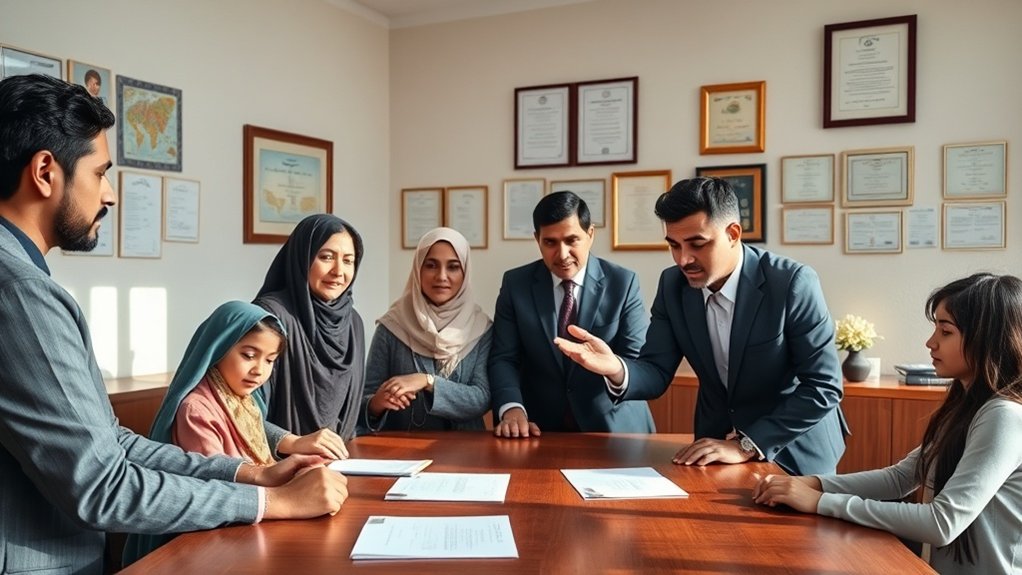
Hundreds of Afghan families have turned to Vieira Braga Advogados for personalized legal guidance throughout the reunification process. When you partner with this team, you’ll benefit from their deep understanding of immigration law and their commitment to every client’s unique needs. Vieira Braga Advogados listens to your concerns, answers your questions, and ensures your case receives careful attention from start to finish.
You won’t have to navigate the complex legal requirements alone. The firm knows how much is at stake, so they break down each stage, simplify paperwork, and advocate for your family’s best interests at every step. Expect them to tailor their support to your individual circumstances, ensuring you feel confident and informed throughout the journey.
Here’s how they stand out:
- Provide clear, timely communication so nothing gets missed.
- Offer culturally sensitive support to respect your background.
- Develop strong legal arguments for your family’s specific situation.
An essential advantage of working with Vieira Braga Advogados is their expertise in current immigration laws, which minimizes risks such as errors in forms or procedural delays.
Gathering Evidence: What You Need to Know
Although the reunion process involves several legal steps, gathering strong evidence of your family relationship is one of the most important tasks you’ll face. Authorities need clear, verifiable proof before approving family reunification. You’ll strengthen your case if you provide thorough, well-organized documentation demonstrating genuine relationships.
Start by collecting official documents like birth certificates, marriage certificates, and passports, but don’t stop there. If you’ve communicated regularly, include communication records, photos together, and other supporting evidence. Always ensure translations are certified when documents aren’t in the official language. Your evidence should tell a clear story about your relationship and timeline. Here’s a quick reference of common evidence types:
| Evidence Type | Examples |
|---|---|
| Identity Documents | Passports, national IDs, birth certificates |
| Marriage Proof | Marriage certificate, wedding photos |
| Parent-Child Links | Birth certificates, hospital records |
| Communication Records | Emails, chat logs, call records |
| Photos Together | Family gatherings, trips, significant events |
Seeking professional guidance from an immigration lawyer can help ensure correct handling of documentation and significantly increase your chances of approval. Collecting comprehensive evidence now can prevent delays later.

Once you’ve gathered your family relationship evidence, paying close attention to deadlines becomes just as important. Immigration cases involving Afghan reunification often have strict, unforgiving timelines. If you miss a submission window or fail to respond in time, your case could be delayed or denied. You’ll need to familiarize yourself with all the relevant rules and track each step as you go. Don’t count on extensions unless there’s a genuine emergency; authorities rarely make exceptions.
To stay on track, try these practical strategies:
- Set reminders for every major deadline, including document submissions and interview dates.
- Create a checklist of required documents and actions so you don’t overlook anything.
- Consult your lawyer frequently to review progress and confirm you’re meeting every requirement.
Staying organized and proactive ensures your family reunification application remains on schedule and avoids unnecessary setbacks due to missed deadlines. Consulting with a legal expert can help avoid procedural errors that might jeopardize your entire application.
Overcoming Language and Cultural Barriers
You’ll face challenges when language differences and unfamiliar customs create misunderstandings in the reunification process. By using effective translation solutions and practicing cultural sensitivity, you can prevent costly mistakes. Let’s look at practical ways to address these barriers and support your case. Consulting with professionals who provide personalized and strategic guidance can further ensure that forms are completed correctly and requirements are fully understood.
Effective Translation Solutions
When navigating Afghan family reunification, clear and accurate translation of documents is crucial to avoid misunderstandings and delays. You need precise translations for everything from birth certificates to marriage documents, as even minor errors can cause major setbacks. It’s essential to use certified translators who not only speak the required languages, but also understand legal terms used in both Afghan and destination country documentation.
To make the translation process efficient and reliable, consider these steps:
- Choose translators with expertise in both Dari/Pashto and the target language’s legal terminology.
- Double-check translations for consistency and accuracy before submitting to authorities.
- Ensure that translated documents are properly certified or notarized as required by the receiving country.
Partnering with legal professionals ensures you receive professional support to navigate both the translation and the broader immigration process, helping you avoid costly mistakes and legal complications. With these strategies, you’ll significantly increase your chances of a smooth reunification process.
Cultural Sensitivity Strategies
Although official documents play a critical role in Afghan family reunification, cultural and language differences can still create obstacles throughout the process. You might encounter misunderstandings because legal terms or customs simply don’t translate directly from one culture to another. To overcome these challenges, take time to learn key cultural values and family structures common within Afghan communities. Don’t assume your perspective matches theirs—ask clear, respectful questions and listen actively. Use interpreters skilled in both language and cultural nuance, not just literal translation. Adapt your communication style by being patient and using plain language. When you prioritize cultural sensitivity, you’ll strengthen trust, avoid unnecessary confusion, and help families feel respected and understood as they navigate complex legal requirements together. Engaging the support of an attorney with specialized legal assistance can further improve communication and increase the chances of a successful reunification outcome.
Real Stories: Vieira Braga Advogados’ Successes
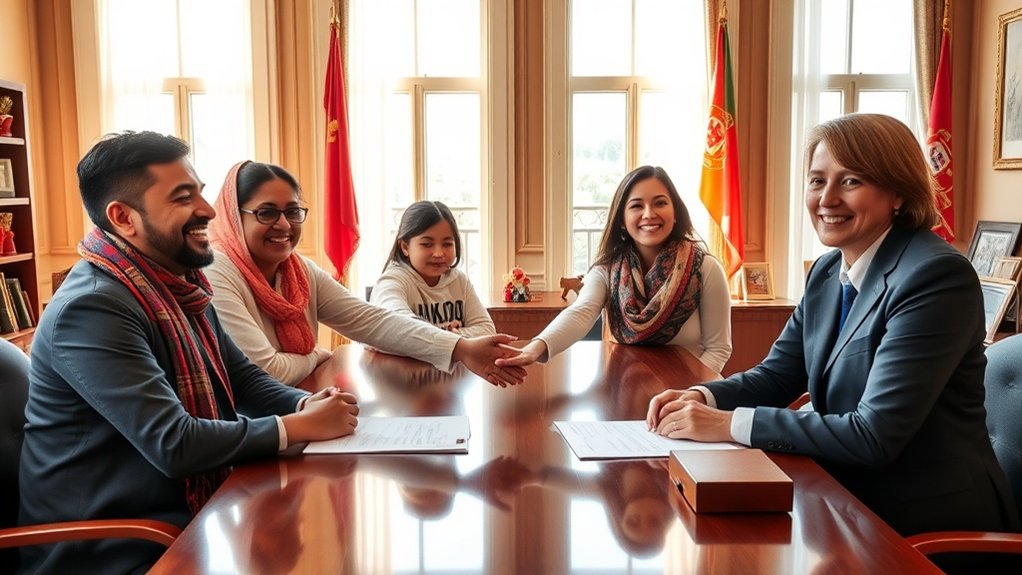
Through years of dedicated work, Vieira Braga Advogados has guided numerous Afghan families through the complex reunification process, turning uncertainty into relief. You’ll find that their hands-on approach means you’re never left wondering what comes next. Clients often share stories of waiting years for answers—only to finally embrace their loved ones, thanks to the firm’s detailed strategies and cultural sensitivity.
Here are just a few ways Vieira Braga Advogados has brought families back together:
- Helped a mother separated from her children gather convincing documentation, overcoming the lack of official records.
- Assisted siblings in navigating discrepancies in translated documents, preventing unnecessary rejection.
- Supported a young couple in using affidavits from community members when paperwork was missing.
You’ll see that real results come from understanding both legal systems and personal stories. If you’re worried your case is too difficult, you can trust in Vieira Braga Advogados’ proven track record.
Preparing for Interviews and Hearings
Having the right documents and support can unite families, but another key moment awaits: interviews and hearings with immigration authorities. You need to prepare thoroughly for these crucial meetings. Authorities may ask detailed questions about your family history, personal relationships, and submitted documents. Review all your evidence carefully so your answers match your paperwork. It’s wise to discuss possible questions with your lawyer at Vieira Braga Advogados, who’ll guide you through mock interviews and clarify anything that seems unclear.
Stay calm during the interview, answer honestly, and don’t guess if you’re unsure. If you don’t understand a question, ask for clarification rather than risking a wrong answer. Consistency is vital—conflicting information can cause delays or even denials. Having professional legal support present shows authorities you’re serious and well prepared. Remember, clear communication and honesty strengthen your case and help ensure your family’s reunification process stays on track.
Frequently Asked Questions
What Are Vieira Braga Advogados’ Service Fees for Family Reunification Cases?
You won’t find fixed service fees for family reunification cases with Vieira Braga Advogados, since costs typically depend on your case’s complexity and specific legal needs. They’ll usually offer an initial consultation to discuss your situation and present a tailored fee proposal. It’s important to clarify what’s included—like document review, application prep, and follow-up. Don’t hesitate to ask about payment plans or extra charges so you’re fully prepared from the start.
Do They Offer Remote Consultations for Clients Outside Brazil?
Yes, you can schedule remote consultations if you’re outside Brazil. They use video calls, email, and messaging apps to keep communication simple and convenient. This approach allows you to discuss your situation, get advice, and send necessary documents without traveling. You’ll be able to ask questions in real time, clarify doubts, and move forward with your family reunification process, no matter where you are located in the world.
What Languages Do the Vieira Braga Advogados Team Members Speak?
You can communicate with Vieira Braga Advogados in multiple languages. Their team speaks Portuguese and English fluently, which helps them assist you if you’re more comfortable in either language. Some team members may also speak Spanish, making interactions with a broader international clientele smoother. If you require services in another language, don’t hesitate to ask—they’ll do their best to accommodate your needs and ensure clear, effective communication during your legal process.
Is Financial Assistance Available for Low-Income Afghan Families?
Yes, you can find financial assistance if you’re a low-income Afghan family seeking reunification. Many governments, NGOs, and international organizations offer grants or support for travel, document processing, and basic needs during the application process. You should check with agencies like the International Organization for Migration (IOM), local charities, or legal aid programs. Make sure to gather the required documents and ask about eligibility as soon as possible to get timely help.
How Long Has Vieira Braga Advogados Handled Afghan Reunification Cases?
They’ve handled Afghan reunification cases for several years, combining their experience with up-to-date immigration policies to support families like yours. When you reach out, you’ll find that their attorneys already understand the unique challenges Afghan families face. They won’t just give you generic advice — they’ll guide you through every step with your background in mind. Their longstanding work ensures you’re not starting the process with someone new to these complex reunification issues.
Conclusion
When you’re navigating the challenging process of Afghan family reunification, you shouldn’t have to do it alone. Vieira Braga Advogados stands by your side every step of the way, making sure your documents are flawless and your case is strong. Their deep expertise, cultural understanding, and dedication boost your chances of reuniting with your loved ones. Trust their team to guide you, minimize mistakes, and help you move forward toward a brighter, united future.

